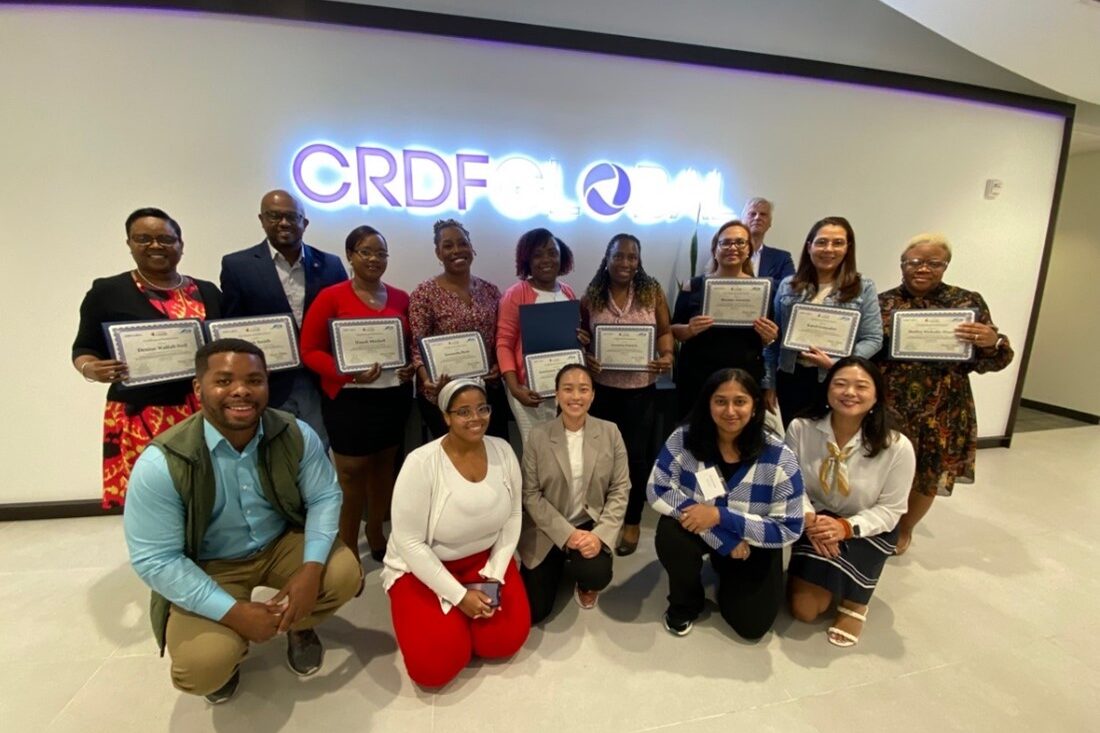Building Counterproliferation Finance Regional Champions in Latin America and the Caribbean

By JuAn Lee-Thacker, UN Sanctions Compliance Team
As part of its mission to build counterproliferation finance regional champions in Latin America and the Caribbean, CRDF Global welcomed nine finance professionals to Washington, D.C. for a one-week study tour on September 9–15, 2023. With the generous support of Global Affairs Canada’s (GAC) Weapons Threat Reduction Program (WTRP), participants from public and private financial institutions in the Bahamas, Barbados, Jamaica, Mexico, Panama, and Trinidad and Tobago joined the study tour to learn about Democratic People’s Republic of Korea (DPRK) proliferation finance activities and risks in financial institutions of Latin America and the Caribbean. Topics of this study tour included DPRK proliferation and sanctions evasion activities, counterproliferation finance, North Korea in Latin America and the Caribbean, anti-money laundering, counterproliferation finance in the maritime sector, cryptocurrency fundamentals and its use in proliferation financing, and cybersecurity best practices.

CRDF Global partnered with Compliance and Capacity Skills International (CCSI) as the lead trainer for this study tour. Enrico Carisch, CEO of CCSI, contributed his knowledge and expertise on DPRK-related counterproliferation finance and international sanctions to mentor and guide the participants throughout the study tour and their collaborative final project. At the end of each day of the study tour, Carisch led roundtable discussions to debrief the day’s training sessions and gauge the participants’ ideas for the final project. Other presenters from CCSI included Durra Sahtout, Maiko Takeuchi, and Neil Watts. Durra Sahtout discussed cybersecurity vulnerabilities in counterproliferation finance with key methods that the DPRK uses in its cyber-enabled proliferation financing strategies. Maiko Takeuchi and Neil Watts, both former UN Panel of Experts on North Korea members, addressed DPRK-related counterproliferation finance risks in Latin America and the Caribbean in the finance and maritime sectors. Taekuchi and Watts both led several exercises to address common red flags and indicators of illicit activities including sanctions evasion methods.
CRDF Global also partnered with Chainalysis, CipherTrace, Organization of American States (OAS), Pillsbury Law, and Jean Lee, host of the BBC’s Lazarus Heist, as supporting trainers for the study tour. The supporting trainers provided one- to two-hour training sessions on their topics of expertise with links to illicit DPRK activities in Latin America and the Caribbean.
Participants were given the opportunity to visit the Chainalysis office in Washington, D.C., where they participated in an in-depth training session on blockchain related to North Korea. In their presentation, Molly Chambers, Kelly Looman, and Adam Hart of Chainalysis included a deep dive into the Harmony Bridge and Ronin Bridge case studies and discussed with participants how compliance officers would investigate suspicious transactions involving cryptocurrencies. The trainers also emphasized proliferation finance risks within Latin America and the Caribbean due to the increase in cryptocurrency businesses and operations in these regions in response to high demand.
Robert Sanchez of CipherTrace provided a basic overview of cryptocurrency concepts, such as blockchain, virtual asset service providers (VASPs), obfuscation methodologies, five dimensions of VASP risks, Know-Your-Customer processes, and fiat capabilities for anti-money laundering. He then applied these concepts to DPRK case studies on crypto-enabled proliferation finance.
Jean Lee, co-host of the BBC’s Lazarus Heist podcast, introduced a cultural connection between the DPRK’s proliferation activities and its people. She spoke on her experience living as a U.S. journalist in North Korea and North Korea’s cybercrime efforts with an emphasis on the Lazarus Group, a North Korean state-sponsored cybercriminal group.
The OAS invited the participants to its historic building, where the participants were welcomed with a educational tour with an emphasis on cultural diplomacy and an overview of the OAS and its missions. Ambassador Sebastian Kraljevich, Permanent Representative of Chile and the Chair of the Inter-American Committee against Terrorism (CICTE), and Allison August Treppel, Marcelo Martinez, and Maria Fernanda Sarimiento of OAS explained the organization’s missions to counter the financing of terrorism and proliferation, and the nonproliferation objectives they strive to achieve. Sarimiento also explained financial sanctions and the main threats faced in the participants’ jurisdictions.
Pillsbury Law also welcomed the participants to their office. Aaron Hutman of Pillsbury Law explained the legal perspectives of sanctions and export controls imposed on North Korea by the United Nations and the United States, Financial Action Task Force (FATF) countermeasures, and anti-money laundering best practices. Hutman emphasized the societal influence and significance that following FATF recommendations has on countries to cooperate with UN Security Council Resolutions (UNSCRs).
The training sessions in the study tour sparked animated discussions among the participants and presenters. Participants expressed a high level of interest in learning more about North Korea as a threat actor, proliferation finance risks within their countries, raising awareness of such risks, and how to identify and mitigate these threats. After the study tour, participants left high remarks saying, “I am appreciative to both the organizers and participants for this timely, thought-provoking, and education[al] exchange,” and “The quality of the content and the effectiveness of the workshop in delivering valuable insights was excellent. The information shared has increased my knowledge of PF [proliferation finance] and sanctions exponentially.”
Following the week-long, in-person portion of the study tour in September, the participants began collaborating on their final project involving a research paper and a webinar. The research paper will be finalized in November 2023, and the participants will introduce the paper through a webinar in December 2023. The paper will also be shared at the ACAMS Caribbean Conference on December 12, 2023.
With the continued support of GAC’s WTRP, CRDF Global will continue to convene capacity-building workshops in 2023 and 2024 on counterproliferation finance topics for audiences including financial institutions and sanctions compliance professionals.
To learn more about CRDF Global’s work in counterproliferation, please click here.



